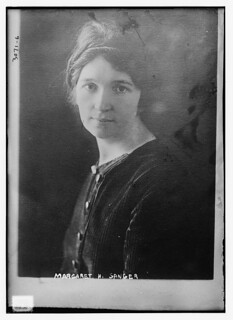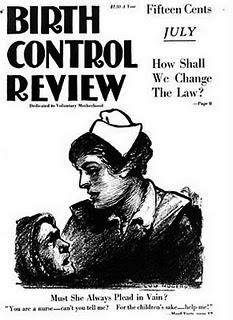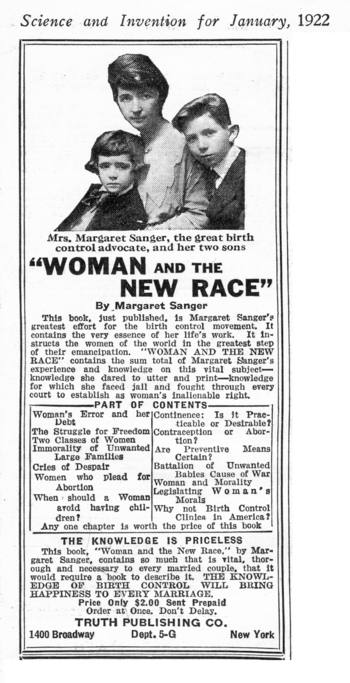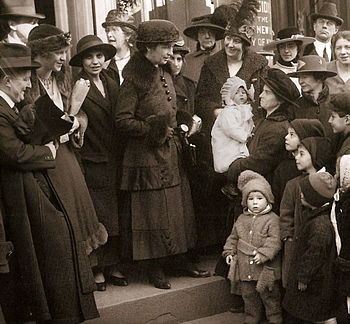Do you remember the time when, if you wanted to prevent pregnancy, your best hopes were abstinence, prayer, or douching with Lysol? (Hell, yes, it burned.) When your doctor was
forbidden by law to give you information on how to prevent pregnancy (even if you were a married woman, and
begging for it)? When countless American infants and mothers died every year because of malnutrition, complications from constant childbearing, and illegal abortions?
Neither do I, but it wasn't so very long ago that
Margaret Sanger, née Higgins, was born into
that America. It was largely due to her
tireless activism on
birth control (a term she popularized), that it wasn't the world she left when she died in 1966.
Unfortunately, both in her own time, and in recent years, the name of Margaret Sanger has been splattered with so much mud and outright lies that the incredible, if flawed, woman that she was, has become hidden and distorted by the propaganda. Even the modern organization descended from the original clinics and organizations she founded,
Planned Parenthood, shies away from discussing Margaret Sanger. But
why?
Comstock and his Pervy Little Laws
There once was a "Christian" man, Anthony Comstock, born in 1844, who epitomized H.L. Mencken's quote about Puritanism:
"the haunting fear that someone, somewhere, is having a good time." Comstock served in the Union Army during the Civil War (incessantly complaining about the other soldiers' profanity), formed the New York Society for the Suppression of Vice, and in 1873 was able to get a law passed in Congress prohibiting delivery via US mail or publication of "obscene, lewd or lascivious material."
According to Comstock, pretty much all drawings, photographs, or information about sexual organs or how they worked were obscene. This included material on prevention of venereal diseases, as well as contraceptive information... Even some anatomy textbooks were prohibited from being sent to medical students via US mail.
Comstock became a special Postal Inspector, and would later brag that he was responsible for about 4,000 arrests and 15 suicides.
No Birth Control = Poverty + Needless Death for Many Women & Children
|
|
| English: Cover of Birth Control Review July 1919 Captions: "How shall we change the law?", "Must She Always Plead in Vain? "You are a nurse - can you tell me? For the children's sake - help me!" (Photo credit: Wikipedia) |
This included Margaret Higgins Sanger's mother. The inference that this was a major impetus to Sanger's "calling" as the vanguard of the Birth Control movement cannot be denied. Anne Purcell Higgins died at age 48 of tuberculosis, much exacerbated by constant childbearing. She endured eighteen pregnancies in twenty-two years, with eleven living children and seven miscarriages, one nearly resulting in her death. Margaret Louise, born in 1879, was the sixth child, with the next living child, Ethel, following four years later. The family was so poor, one story goes, that when one of Margaret's brothers tore his (only) trousers, he was forced to attend school in a dress, while his mother mended his pants.
Margaret dreamed of becoming a doctor, but funds (donated from her older sisters) simply weren't available to permit more than a few years schooling as a nurse. As a nurse in the early 1900's, she often visited impoverished families with large broods of children, and met countless women who begged for help in preventing another pregnancy. Many women died of complications from childbirth or illegal abortions, to which they often resorted out of desperation.
While a modern, well-nourished American woman under good medical supervision may be able to bear large broods of healthy children with few complications, women who are badly nourished, or ill with syphilis, HIV, tuberculosis, or other diseases, who live in slums or in poor rural areas with little medical attention, rarely enjoy the same rosy outcome. No mother wants to abandon, via her own death, her existing children, yet this was a frequent scenario.
Sadie Sachs - True Story, or Composite?
Sanger would later tell and retell the story of Sadie Sachs, a 28-year old mother of three in the Jewish ghettos of New York, who she helped nurse through the complications of a botched abortion. Sachs begged the doctor who initially treated her for advice about preventing another pregnancy: "Another baby will finish me." The doctor had little sympathy: "You want your cake while you eat it too, do you? Well, it can't be done. I'll tell you the only sure thing to do... Tell Jake to sleep on the roof." Several months later, Sanger returned to the apartment, to find Sadie dying from septicemia, from another botched abortion.
While this story may or may not have been true, what is undeniable is that there were many "Sadie Sachs" in 1912, dying or suffering from lack of knowledge and access to birth control. Sanger felt strongly that it was an:
unjust world that offered women in their married state only celibacy, abortion, and too many children as their reproductive choices.
Sanger Was the First Pro-Choicer
What women desire is the knowledge which will enable them to have as few children as they themselves consider consistent with their health, their desires, their opportunities for development, their economic resources, their ability to rear and educate.
Note:
Pro-choice ≠ Pro-abortion. I tell you three times:
Pro-choice ≠ Pro-abortion; Pro-choice ≠ Pro-abortion; Pro-choice ≠ Pro-abortion. While Sanger has been slandered in many different ways, one of the most egregious is calling her a "baby killer." Why she reluctantly agreed that in some rare cases, a
therapeutic abortion might be medically necessary, she NEVER advocated for abortion "as a form of birth control," as she has often been accused.
...while there are cases when even the law recognizes an abortion as justifiable if recommended by a physician, I assert that the hundreds of thousands of abortions performed in America each year are a disgrace to civilization.
Her first handbills, for her first clinic in Brownsville, New York in 1916, advised:
MOTHERS! Can you afford to have a large family? Do you want any more children? IF not, why do you have them? DO NOT KILL, DO NOT TAKE LIFE, BUT PREVENT.
Sanger believed that if knowledge and methods of birth control were widely known, affordable, effective, and easy to use, abortion would become rare.
We've Come A Long Way, (No) Baby
But there's still such a long way to go when it comes to birth control devices. In the early 1900's, there was abstinence (something Sanger and others did not believe was a very reasonable way to conduct a marriage), there was withdrawal (although the Catholic Church cast a heavy frown on 'Onanism'), there were various douches (see Lysol) and pessaries (basically, diaphragms, but officially used to 'support' a sagging uterus), and there were condoms.
Sanger believed the best option would be one the woman herself controlled, rather than relying upon her partner's cooperation, and spent many woman-hours in European jaunts looking for what they used. Was it better? Was it worth trying? How would it work in a tenement apartment in New York where one bathroom was shared by four or five floors of tenants? (A downside to some of the experimental sponges with powder that required adding water.)
|
|
| Different kinds of birth control pills. (Photo credit: Wikipedia) |
Later, largely in response to Sanger popularizing the discussion of birth control, the Catholic Church would devise 'the Rhythm Method' as an acceptable way to 'space' babies. (But it was supposed to be only for extreme medical conditions, and it also had the drawback of not working very reliably for most women, whose cycles are generally irregular.)
During Sanger's travels, as she encountered various types of birth control projects, she encouraged them, always verbally, often with donations directed their way. When it came to The Pill, Margaret Sanger became its Fairy Godmother. In 1953, she introduced wealthy donor Katherine McCormick to Dr. Gregory Pincus and his collaborator, M.C. Chang, who were working on an anovulant project that became The Pill. (And coincidentally, The Pill was able to help women with infertility problems.) Sanger also encouraged the development of IUD's.
Writer, Propagandist, Clinic Founder, Lobbyist, International Activist, Feminist
|
|
| Sanger and her sons in a 1922 advertisement for one of her books (Photo credit: Wikipedia) |
She wrote a series called "What Every Girl Should Know" for the
New York Call, which was sometimes seized and other times, censored; she wrote pamphlets and in 1916, opened a clinic in Brooklyn, New York. Lines outside the clinic were long, but it served several hundred clients before it was raided and shut down after operating less than a week.
Still, somehow, she continued writing, continued lining up supporters, continued fundraising on a level never-heretofore seen, opened more clinics, lobbied for changes in the law(s), lined up support for birth control support internationally...
Sanger believed that when population growth exceeded local natural resources, war became the natural result. As a pacifist, Sanger thought it was better to limit population growth to what the local area could sustain, rather than raise excess population as soldiers and cannon fodder.
She had birth control advocates in Japan, in India, in the UK, and in the USA, and sponsored numerous international conferences. She continued to open or encourage the opening of clinics across the USA, which served the purpose of helping women's health, including, but not limited to, birth control.
Yes, she did hold "radical" ideas, including the one that each woman should be free to choose her own destiny.
So Where's The Controversy?
Was Sanger A Racist?
This is another allegation that has been flung so many times that people begin to think there must be
something to it.
Of course, none of us can read Sanger's mind. But she
insisted that whites be willing to work with blacks.
We must change the white attitudes... When you have Negroes working with whites you have the break down of barriers, the beginning of progress. Negro participation in planned parenthood means democratic representation in a democratic idea. Like other democratic ideas, planned parenthood places a greater value on human life and the dignity of each person.
She opened clinics for black women, not because she perceived them as particularly needing to be restrained in the fecundity, but
at the request of African-American leaders like W.E.B. Dubois, Mary McLeod Bethune, founder of the National Council of Negro Women, and Adam Clayton Powell, Jr., pastor of the Abyssianian Baptist Church. She put black community leaders on the board, with black staff and doctors at the clinics.
|
|
| English: 1917 photo of Margaret Sanger. (Photo credit: Wikipedia) |
She was sensitive to the idea that people might imagine she and her staff we trying to eradicate the African-American race (not there really is such a thing, biologically speaking). She wanted to offer black women the same tools to choose the number of children they would bear as she was offering to white women. African-Americans were NOT targeted (by her) in an attempt to wipe them out, despite ongoing LIES to the contrary.
We have got to change the inference that the quality of our population depends on the birth rate of college graduates. To me this is tinsel thinking. [There are] just as sound qualities in Arizona cowboys, mechanics, and artists. Racial regeneration must come from within and be autonomous, self-directed and not imposed from without.
Martin Luther King, Jr. was
pleased to receive the Margaret Sanger award from Planned Parenthood in 1966. In part his speech, delivered by his wife Coretta Scott King, read:
There is a striking kinship between our movement and Margaret Sanger’s early efforts. She, like we, saw the horrifying conditions of ghetto life. Like we, she knew that all of society is poisoned by cancerous slums. Like we, she was a direct actionist — a nonviolent resister. She was willing to accept scorn and abuse until the truth she saw was revealed to the millions. At the turn of the century she went into the slums and set up a birth control clinic, and for this deed she went to jail because she was violating an unjust law. Yet the years have justified her actions. She launched a movement which is obeying a higher law to preserve human life under humane conditions. Margaret Sanger had to commit what was then called a crime in order to enrich humanity, and today we honor her courage and vision; for without them there would have been no beginning. Our sure beginning in the struggle for equality by nonviolent direct action may not have been so resolute without the tradition established by Margaret Sanger and people like her.
Doesn't sound much like Dr. King believed she was an inhuman monster intent on destroying the black race, does it?
Was Margaret Sanger a Eugenicist?
This is another label that has been slapped over the history of Margaret Sanger. The answer to that is, it's complicated. Many of the advocates of the early birth control movement
were eugenicists - that is, they believed in the continual improvement of the human race via breeding "superior" human stock and discouraging the breeding of "inferior" stock. Sanger certainly did not want to alienate their backing at a time when she was looking to drum up popular support.
Many religious organizations and people in the early part of the 20th century, were part of the Eugenics Movement,
including President Theodore Roosevelt. While some eugenicists were undoubtedly racist, others had a more nuanced view. Many believed that "morons" (a term applied to people who were not competent to make reproductive decisions) should be sterilized. While Down syndrome (and other developmental delays) happens on a spectrum, and many individuals are high functioning, would it be a terrible thing to sterilize those low-functioning Down syndrome individuals, who are not able to care for a baby, and also may not be able to employ modern birth control methods, yet be sexually active? Personally, I'm not sure. (And who would make that call?)
I believe that, even now, most of us would agree (in theory) that it would be better if
some people didn't breed. For example, I don't want to see Octomom have more kids, or Charles Manson have
any. I am in support of
what Ashley X's parents did to prevent their
Pillow Angel from "becoming a woman" in body, with the mind of a nine-month old baby.
So while,
today, the idea of eugenicists and Hitler are bound together inseparably, this wasn't the case in the decades before Hitler came to power, and it's unfair to infer (or state outright) that Margaret Sanger thought that Hitler's attempted exterminations of Jews, Roma, and others was a grand idea.
Sanger never applied the term "unfit" to entire races and religions, only to individuals. (As do we all, if we are honest about it.)
Man-hater? As if.
Margaret Sanger had more (male) lovers and admirers, not to mention two husbands, than most women had stockings. She married Bill Sanger (a Jew, for those who insist she was anti-Semitic), and had three children by him, although their daughter Peggy died as a young child. Later, she would take many lovers, including sexologist Havelock Ellis, the famous writer H.G. Wells, her biographer, an artist in Tucson... I lost track at a dozen or so men. Along with a second husband, J. Noah Slee.
Somehow, all her men adored her. She was petite, with auburn hair, a great wit, and apparently, was gangbusters in bed.
Never be ashamed of passion. If you are strongly sexed, you are richly endowed.
Somehow, she managed to juggle them all, writing a bouquet of love letters to most of them, without any of them feeling slighted or (much) jealous.
She also had many loyal female friends, somewhat unusual for a "man's woman."
A woman of many talents, indeed.
So who's responsible for all the disinformation about Margaret Sanger?
Yes, Catholic Church, I'm Giving You the Stinkeye
While there are many kind, loving, wonderful people who belong to the Catholic Church,
as an institution, it has too often been on the wrong side of history, justice, and the protection of innocents. To give just five examples: 1) The Crusades, 2) The Inquisition, 3) The cooperation with Hitler, 4) The protection of pedophile priests, 5) The abuse in homes for unwed mothers in Ireland and elsewhere
When it comes to sex and sexuality, the Catholic Church is inconsistent at best. Their position, as I understand it, is that married couples should always be "open" to the possibility that God may grant them a child (and that non-married couples should simply
not be engaging in sexual intercourse, period); otherwise to engage in sex simply for pleasure or emotional bonding is sinful. Yet they have
also decided that for married couples who
know they are infertile, for reasons of age or physical condition, it is
not a sin for them to engage in sex simply for pleasure or bonding.
Huh?
The Catholic Church, which holds non-taxable status in the US as a religious organization, theoretically
not involved in politics, vigorously pressured politicians and lawmakers during the lifetime of Margaret Sanger, and continues to this day (Hobby Lobby, anyone?) to wield tremendous influence on the government of the USA to depart from or void any laws or policies that might encourage use of birth control (at the same time most American Catholic women say
pff! to the Vatican, and use birth control according to their own familial needs).
It is possible, at some time, that the Catholic Church will come to realize that, like a petri dish, the Earth is a closed system. The organisms on it (us humans) can only multiply to a certain extent, before our food and water supply is exhausted, or we are poisoned by the toxicity of our own waste products, or, possibly, both.
So, why the lies?
Societies in which there is more supply (of population) than demand has individuals who are more likely to accept crappy jobs - in factories, on farms, in "service industries," especially if there are too many mouths to feed at home. Young men (and women) who see little potential for finding decent jobs and cannot afford an education are much more likely to enlist in the military, enabling the elite to wage massive wars (and profit thereby *cough Haliburton cough*).
Follow the money.
Who benefits when working class and poor people have more children than they can afford to feed, clothe, house, and educate?
How Should We Remember Sanger?
Her granddaughter, Margaret Marston, recounts one of their last conversations. Margaret Sanger said she hoped she would be remembered "for helping women, because women are the strength of the future. They take care of culture and tradition,and preserve what is good."
 Past Sluts: Go to the For Sluts Only page for links to past sluts in this series.
Past Sluts: Go to the For Sluts Only page for links to past sluts in this series.
What had you ever heard about Margaret Sanger?
Who do you think should control a woman's reproductive choices?
Your thoughts?









